Cross Cultural Management Report: Analysis of Cross-Cultural Issues
VerifiedAdded on 2021/01/02
|6
|1269
|328
Report
AI Summary
This report provides a comprehensive analysis of cross-cultural management, focusing on a case study involving the construction of a dam. The report utilizes the Gibbs reflective model to explore the complexities arising from a diverse workforce with varying cultural backgrounds, practices, and preferences. The core of the report examines the challenges faced by a project manager, Jones, in navigating cultural differences, particularly the conflict between individualism and collectivism, and the impact of these differences on organizational culture and project outcomes. The report delves into issues such as corruption, leadership styles, and the importance of adapting management approaches to foster collaboration and achieve project goals. It also highlights the importance of understanding Hofstede's cultural dimensions, specifically individualism vs. collectivism, and the potential consequences of ignoring cultural sensitivities. The report concludes by emphasizing the need for effective cross-cultural management practices, the adoption of collective cultures, and disciplined leadership to ensure project success and organizational growth. The report draws upon several academic sources to support its arguments, offering valuable insights into the practical application of cross-cultural management principles.

CROSS CULTURAL
MANAGEMENT
MANAGEMENT
Paraphrase This Document
Need a fresh take? Get an instant paraphrase of this document with our AI Paraphraser
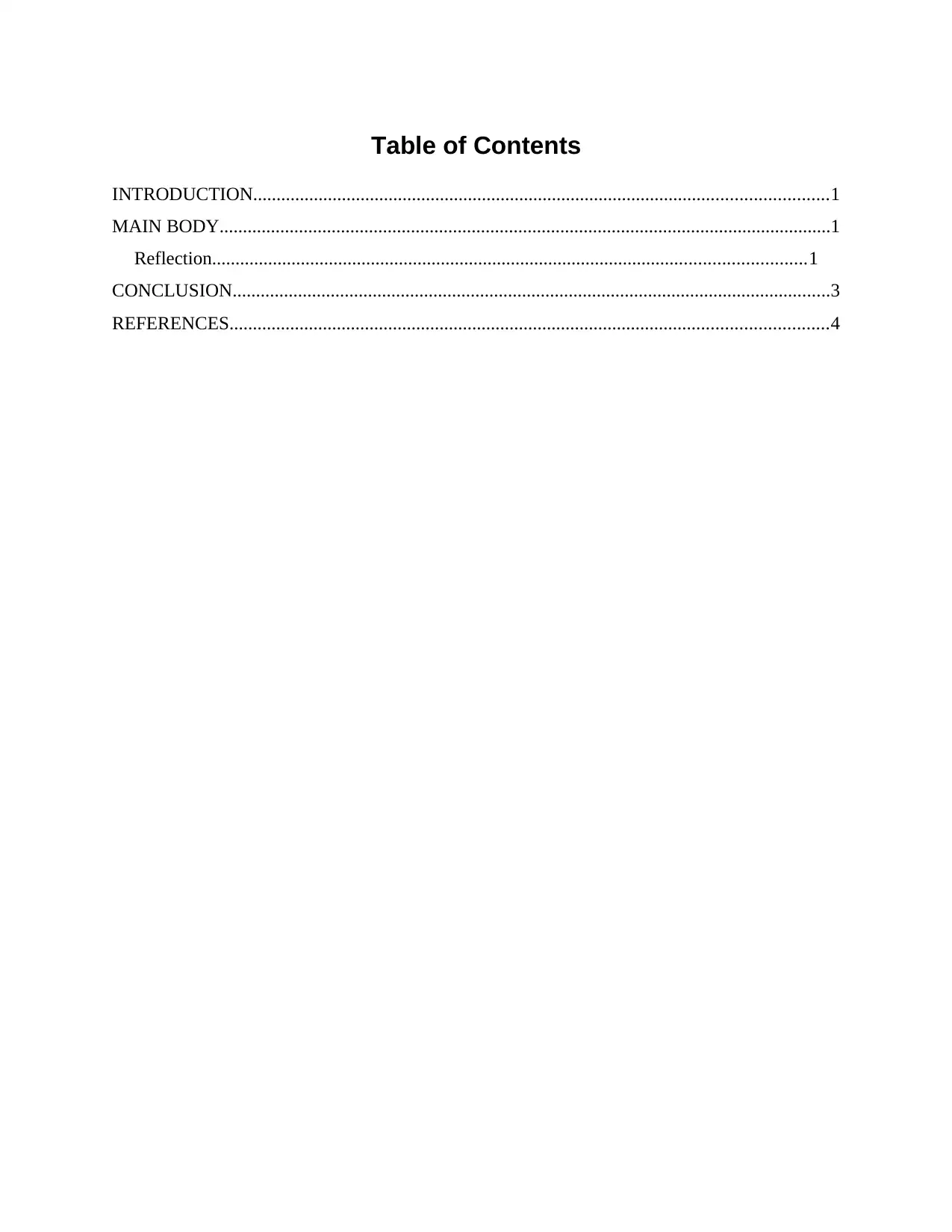
Table of Contents
INTRODUCTION...........................................................................................................................1
MAIN BODY...................................................................................................................................1
Reflection...............................................................................................................................1
CONCLUSION................................................................................................................................3
REFERENCES................................................................................................................................4
INTRODUCTION...........................................................................................................................1
MAIN BODY...................................................................................................................................1
Reflection...............................................................................................................................1
CONCLUSION................................................................................................................................3
REFERENCES................................................................................................................................4
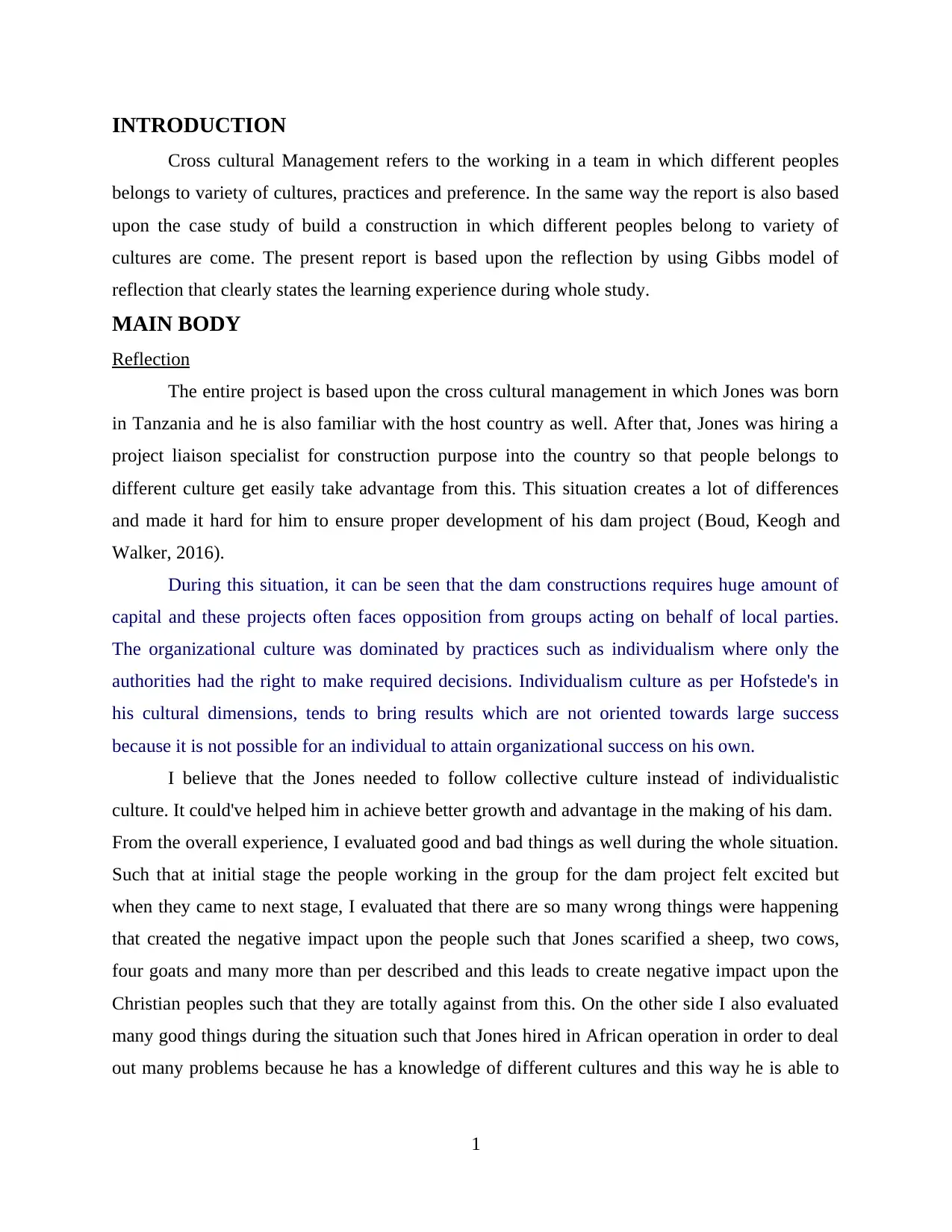
INTRODUCTION
Cross cultural Management refers to the working in a team in which different peoples
belongs to variety of cultures, practices and preference. In the same way the report is also based
upon the case study of build a construction in which different peoples belong to variety of
cultures are come. The present report is based upon the reflection by using Gibbs model of
reflection that clearly states the learning experience during whole study.
MAIN BODY
Reflection
The entire project is based upon the cross cultural management in which Jones was born
in Tanzania and he is also familiar with the host country as well. After that, Jones was hiring a
project liaison specialist for construction purpose into the country so that people belongs to
different culture get easily take advantage from this. This situation creates a lot of differences
and made it hard for him to ensure proper development of his dam project (Boud, Keogh and
Walker, 2016).
During this situation, it can be seen that the dam constructions requires huge amount of
capital and these projects often faces opposition from groups acting on behalf of local parties.
The organizational culture was dominated by practices such as individualism where only the
authorities had the right to make required decisions. Individualism culture as per Hofstede's in
his cultural dimensions, tends to bring results which are not oriented towards large success
because it is not possible for an individual to attain organizational success on his own.
I believe that the Jones needed to follow collective culture instead of individualistic
culture. It could've helped him in achieve better growth and advantage in the making of his dam.
From the overall experience, I evaluated good and bad things as well during the whole situation.
Such that at initial stage the people working in the group for the dam project felt excited but
when they came to next stage, I evaluated that there are so many wrong things were happening
that created the negative impact upon the people such that Jones scarified a sheep, two cows,
four goats and many more than per described and this leads to create negative impact upon the
Christian peoples such that they are totally against from this. On the other side I also evaluated
many good things during the situation such that Jones hired in African operation in order to deal
out many problems because he has a knowledge of different cultures and this way he is able to
1
Cross cultural Management refers to the working in a team in which different peoples
belongs to variety of cultures, practices and preference. In the same way the report is also based
upon the case study of build a construction in which different peoples belong to variety of
cultures are come. The present report is based upon the reflection by using Gibbs model of
reflection that clearly states the learning experience during whole study.
MAIN BODY
Reflection
The entire project is based upon the cross cultural management in which Jones was born
in Tanzania and he is also familiar with the host country as well. After that, Jones was hiring a
project liaison specialist for construction purpose into the country so that people belongs to
different culture get easily take advantage from this. This situation creates a lot of differences
and made it hard for him to ensure proper development of his dam project (Boud, Keogh and
Walker, 2016).
During this situation, it can be seen that the dam constructions requires huge amount of
capital and these projects often faces opposition from groups acting on behalf of local parties.
The organizational culture was dominated by practices such as individualism where only the
authorities had the right to make required decisions. Individualism culture as per Hofstede's in
his cultural dimensions, tends to bring results which are not oriented towards large success
because it is not possible for an individual to attain organizational success on his own.
I believe that the Jones needed to follow collective culture instead of individualistic
culture. It could've helped him in achieve better growth and advantage in the making of his dam.
From the overall experience, I evaluated good and bad things as well during the whole situation.
Such that at initial stage the people working in the group for the dam project felt excited but
when they came to next stage, I evaluated that there are so many wrong things were happening
that created the negative impact upon the people such that Jones scarified a sheep, two cows,
four goats and many more than per described and this leads to create negative impact upon the
Christian peoples such that they are totally against from this. On the other side I also evaluated
many good things during the situation such that Jones hired in African operation in order to deal
out many problems because he has a knowledge of different cultures and this way he is able to
1
⊘ This is a preview!⊘
Do you want full access?
Subscribe today to unlock all pages.

Trusted by 1+ million students worldwide
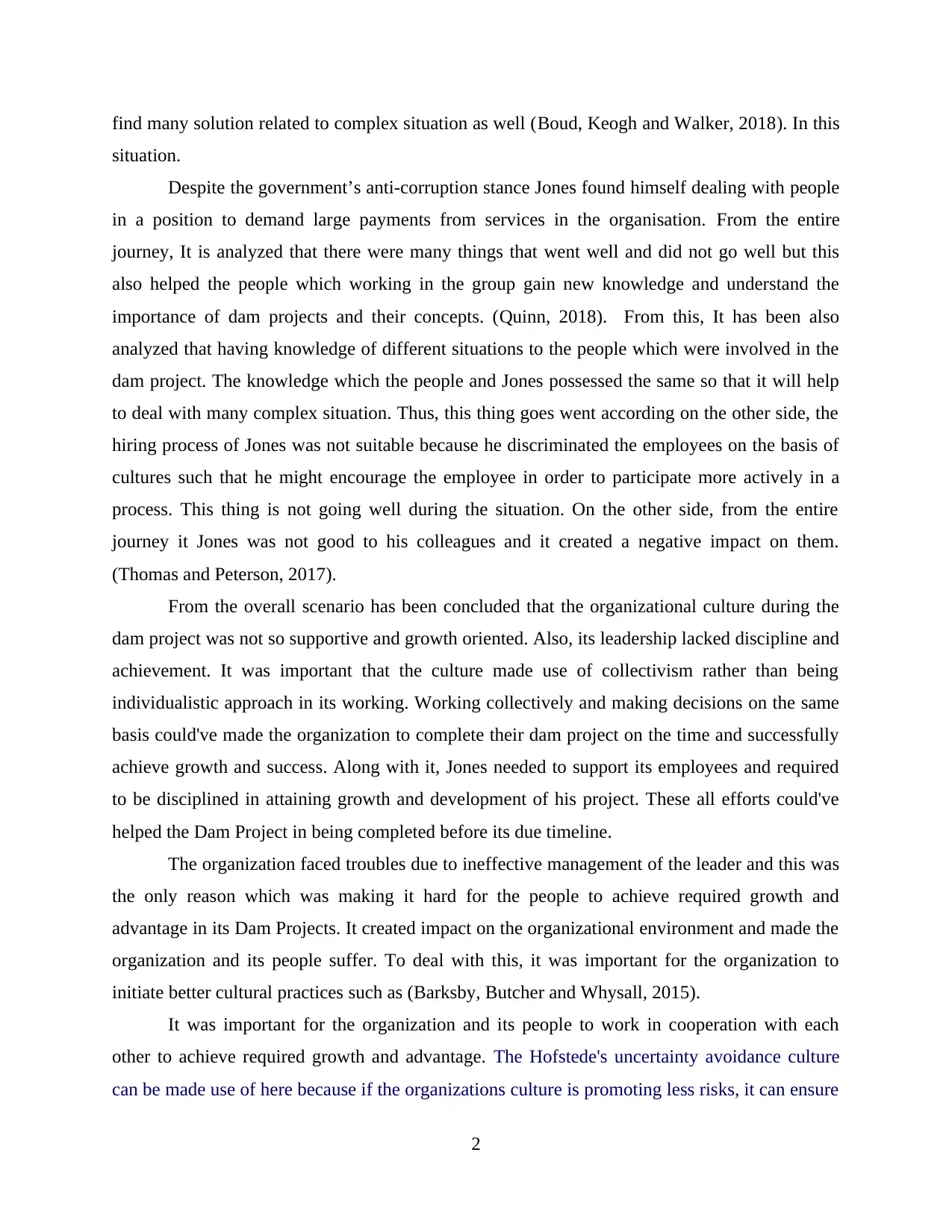
find many solution related to complex situation as well (Boud, Keogh and Walker, 2018). In this
situation.
Despite the government’s anti-corruption stance Jones found himself dealing with people
in a position to demand large payments from services in the organisation. From the entire
journey, It is analyzed that there were many things that went well and did not go well but this
also helped the people which working in the group gain new knowledge and understand the
importance of dam projects and their concepts. (Quinn, 2018). From this, It has been also
analyzed that having knowledge of different situations to the people which were involved in the
dam project. The knowledge which the people and Jones possessed the same so that it will help
to deal with many complex situation. Thus, this thing goes went according on the other side, the
hiring process of Jones was not suitable because he discriminated the employees on the basis of
cultures such that he might encourage the employee in order to participate more actively in a
process. This thing is not going well during the situation. On the other side, from the entire
journey it Jones was not good to his colleagues and it created a negative impact on them.
(Thomas and Peterson, 2017).
From the overall scenario has been concluded that the organizational culture during the
dam project was not so supportive and growth oriented. Also, its leadership lacked discipline and
achievement. It was important that the culture made use of collectivism rather than being
individualistic approach in its working. Working collectively and making decisions on the same
basis could've made the organization to complete their dam project on the time and successfully
achieve growth and success. Along with it, Jones needed to support its employees and required
to be disciplined in attaining growth and development of his project. These all efforts could've
helped the Dam Project in being completed before its due timeline.
The organization faced troubles due to ineffective management of the leader and this was
the only reason which was making it hard for the people to achieve required growth and
advantage in its Dam Projects. It created impact on the organizational environment and made the
organization and its people suffer. To deal with this, it was important for the organization to
initiate better cultural practices such as (Barksby, Butcher and Whysall, 2015).
It was important for the organization and its people to work in cooperation with each
other to achieve required growth and advantage. The Hofstede's uncertainty avoidance culture
can be made use of here because if the organizations culture is promoting less risks, it can ensure
2
situation.
Despite the government’s anti-corruption stance Jones found himself dealing with people
in a position to demand large payments from services in the organisation. From the entire
journey, It is analyzed that there were many things that went well and did not go well but this
also helped the people which working in the group gain new knowledge and understand the
importance of dam projects and their concepts. (Quinn, 2018). From this, It has been also
analyzed that having knowledge of different situations to the people which were involved in the
dam project. The knowledge which the people and Jones possessed the same so that it will help
to deal with many complex situation. Thus, this thing goes went according on the other side, the
hiring process of Jones was not suitable because he discriminated the employees on the basis of
cultures such that he might encourage the employee in order to participate more actively in a
process. This thing is not going well during the situation. On the other side, from the entire
journey it Jones was not good to his colleagues and it created a negative impact on them.
(Thomas and Peterson, 2017).
From the overall scenario has been concluded that the organizational culture during the
dam project was not so supportive and growth oriented. Also, its leadership lacked discipline and
achievement. It was important that the culture made use of collectivism rather than being
individualistic approach in its working. Working collectively and making decisions on the same
basis could've made the organization to complete their dam project on the time and successfully
achieve growth and success. Along with it, Jones needed to support its employees and required
to be disciplined in attaining growth and development of his project. These all efforts could've
helped the Dam Project in being completed before its due timeline.
The organization faced troubles due to ineffective management of the leader and this was
the only reason which was making it hard for the people to achieve required growth and
advantage in its Dam Projects. It created impact on the organizational environment and made the
organization and its people suffer. To deal with this, it was important for the organization to
initiate better cultural practices such as (Barksby, Butcher and Whysall, 2015).
It was important for the organization and its people to work in cooperation with each
other to achieve required growth and advantage. The Hofstede's uncertainty avoidance culture
can be made use of here because if the organizations culture is promoting less risks, it can ensure
2
Paraphrase This Document
Need a fresh take? Get an instant paraphrase of this document with our AI Paraphraser
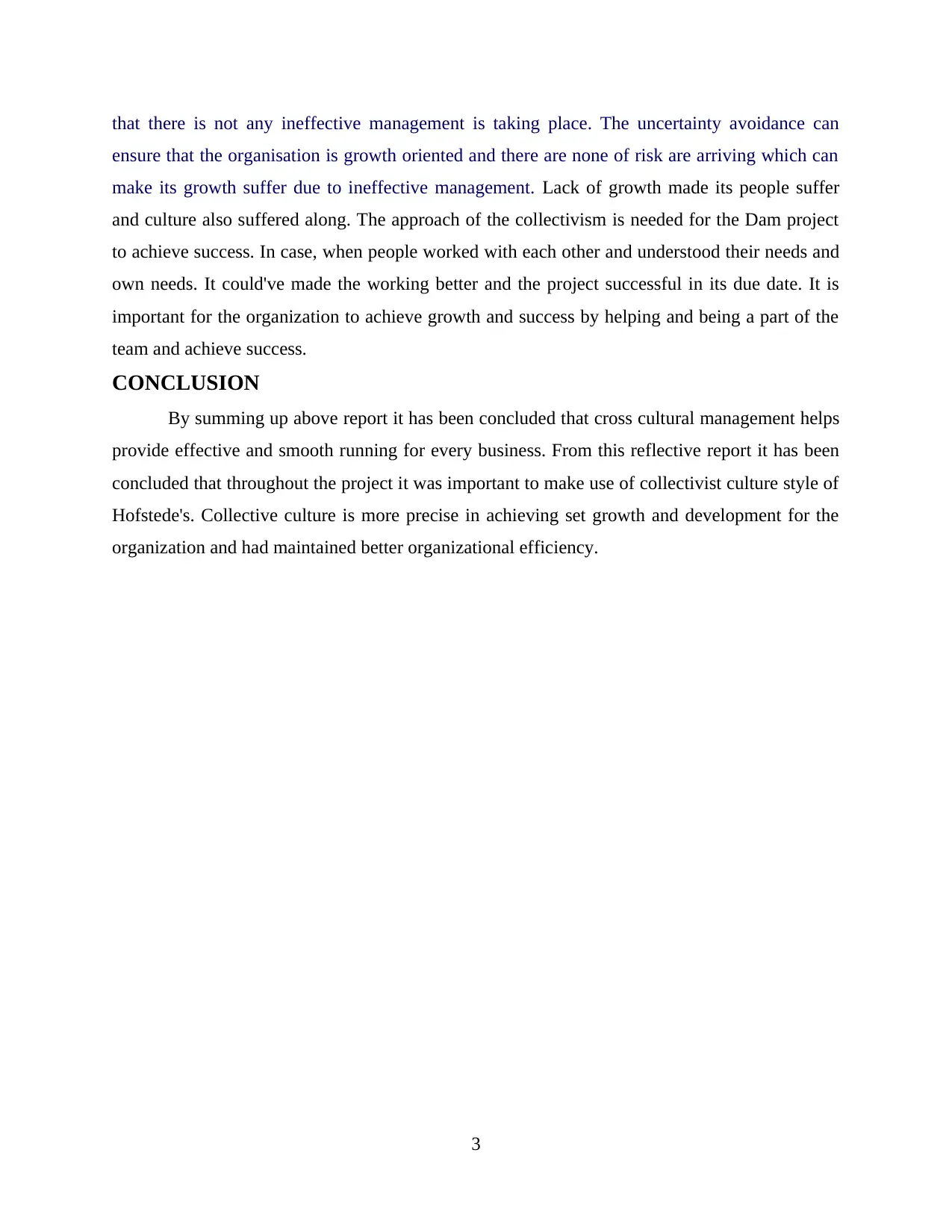
that there is not any ineffective management is taking place. The uncertainty avoidance can
ensure that the organisation is growth oriented and there are none of risk are arriving which can
make its growth suffer due to ineffective management. Lack of growth made its people suffer
and culture also suffered along. The approach of the collectivism is needed for the Dam project
to achieve success. In case, when people worked with each other and understood their needs and
own needs. It could've made the working better and the project successful in its due date. It is
important for the organization to achieve growth and success by helping and being a part of the
team and achieve success.
CONCLUSION
By summing up above report it has been concluded that cross cultural management helps
provide effective and smooth running for every business. From this reflective report it has been
concluded that throughout the project it was important to make use of collectivist culture style of
Hofstede's. Collective culture is more precise in achieving set growth and development for the
organization and had maintained better organizational efficiency.
3
ensure that the organisation is growth oriented and there are none of risk are arriving which can
make its growth suffer due to ineffective management. Lack of growth made its people suffer
and culture also suffered along. The approach of the collectivism is needed for the Dam project
to achieve success. In case, when people worked with each other and understood their needs and
own needs. It could've made the working better and the project successful in its due date. It is
important for the organization to achieve growth and success by helping and being a part of the
team and achieve success.
CONCLUSION
By summing up above report it has been concluded that cross cultural management helps
provide effective and smooth running for every business. From this reflective report it has been
concluded that throughout the project it was important to make use of collectivist culture style of
Hofstede's. Collective culture is more precise in achieving set growth and development for the
organization and had maintained better organizational efficiency.
3
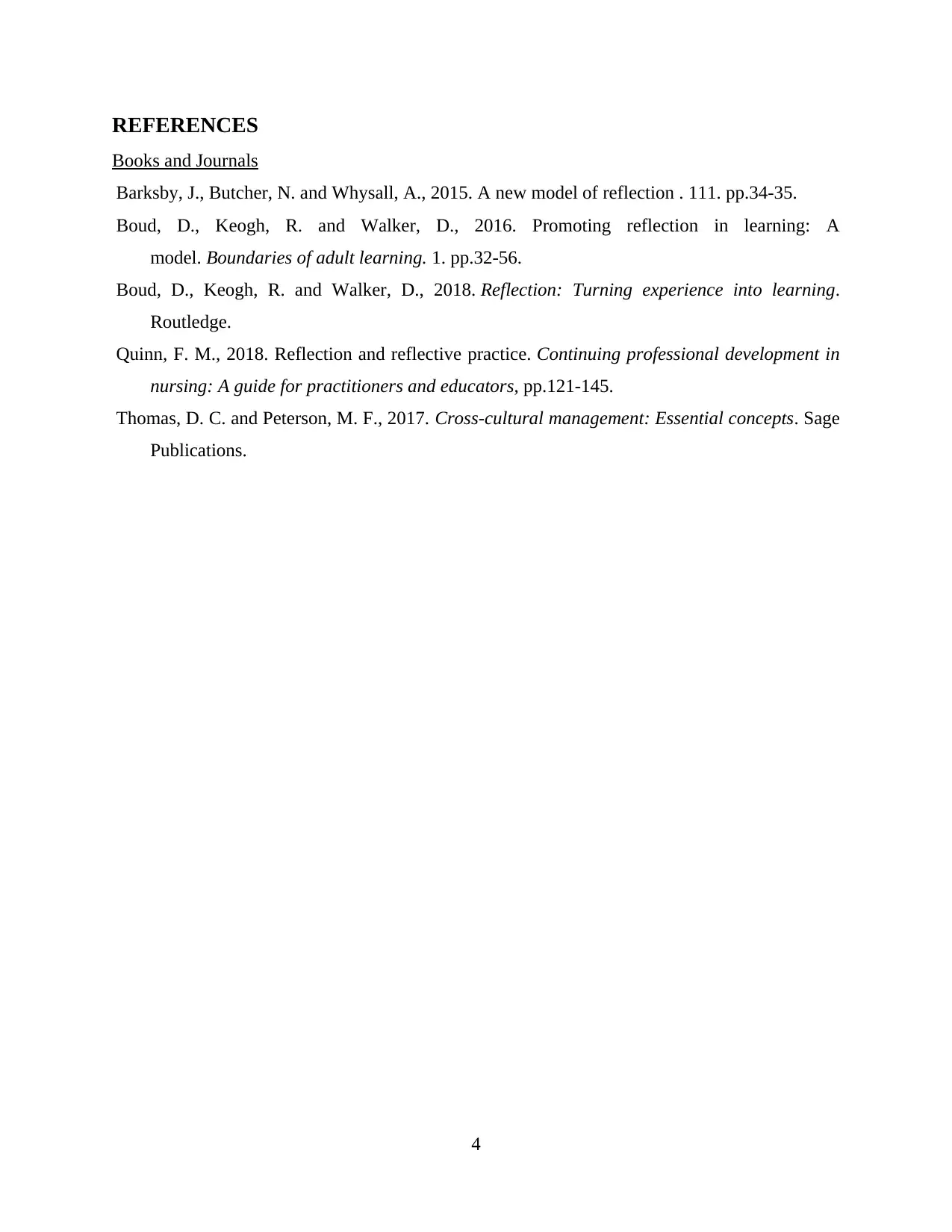
REFERENCES
Books and Journals
Barksby, J., Butcher, N. and Whysall, A., 2015. A new model of reflection . 111. pp.34-35.
Boud, D., Keogh, R. and Walker, D., 2016. Promoting reflection in learning: A
model. Boundaries of adult learning. 1. pp.32-56.
Boud, D., Keogh, R. and Walker, D., 2018. Reflection: Turning experience into learning.
Routledge.
Quinn, F. M., 2018. Reflection and reflective practice. Continuing professional development in
nursing: A guide for practitioners and educators, pp.121-145.
Thomas, D. C. and Peterson, M. F., 2017. Cross-cultural management: Essential concepts. Sage
Publications.
4
Books and Journals
Barksby, J., Butcher, N. and Whysall, A., 2015. A new model of reflection . 111. pp.34-35.
Boud, D., Keogh, R. and Walker, D., 2016. Promoting reflection in learning: A
model. Boundaries of adult learning. 1. pp.32-56.
Boud, D., Keogh, R. and Walker, D., 2018. Reflection: Turning experience into learning.
Routledge.
Quinn, F. M., 2018. Reflection and reflective practice. Continuing professional development in
nursing: A guide for practitioners and educators, pp.121-145.
Thomas, D. C. and Peterson, M. F., 2017. Cross-cultural management: Essential concepts. Sage
Publications.
4
⊘ This is a preview!⊘
Do you want full access?
Subscribe today to unlock all pages.

Trusted by 1+ million students worldwide
1 out of 6
Related Documents
Your All-in-One AI-Powered Toolkit for Academic Success.
+13062052269
info@desklib.com
Available 24*7 on WhatsApp / Email
![[object Object]](/_next/static/media/star-bottom.7253800d.svg)
Unlock your academic potential
Copyright © 2020–2025 A2Z Services. All Rights Reserved. Developed and managed by ZUCOL.





